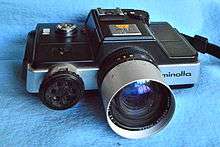Minolta 110 Zoom SLR
 | |
| Type | 110 submini SLR |
|---|---|
| Lens mount | Fixed 25-50 mm zoom lens |
| Focus | Manual focus |
| Exposure | Aperture priority autoexposure |
| Flash | Hot shoe only |
| Dimensions | 53.5 x 108 x 132 mm, 430 g |
 Minolta 110 Mk II | |
| Type | 110 submini SLR |
|---|---|
| Lens mount | Fixed 25-67 mm ƒ3.5 zoom lens |
| Focus | Manual focus |
| Exposure | Aperture priority autoexposure |
| Flash | Hot shoe only |
The Minolta 110 Zoom SLR was a 110 format single-lens reflex (SLR) camera produced by Minolta of Japan between 1976 and 1979. It was the first SLR in 110 format. It had an unusual, flattened shape. Other 110 SLRs were shaped like SLRs in larger formats, but the 110 Zoom SLR took the flat format of the typical 110 pocket camera and added a larger lens and prism hump to it. 1979's replacement, the Minolta 110 Zoom SLR Mark II, had a more conventional shape.
The 110 Zoom SLR provided aperture priority autoexposure; fully manual exposure was not available. Light metering was with a CdS meter mounted on the front of the camera. An exposure compensation dial allowed the photographer to compensate for unusual lighting situations; it also allows the use of film speeds other than the ISO 100 and 400 auto-selected by the cartridge tab, by applying the appropriate compensation factor.
The lens was a fixed 25–50 mm f/4.5-16 manual focus zoom with macro focusing down to 11 in (280 mm). This gave a field of view range approximately equivalent to a 50–100 mm zoom lens on a 35 mm format camera. There was a built-in, pop out lens shade. The filter thread diameter was 40.5 mm. Minolta sold UV, yellow and 1B filters.
Available shutter speeds were 1/1000 second through 10 seconds, with a 1/150 second X-sync speed and support for bulb exposure. There was no built-in flash, but a hot shoe on the top allowed an external flash to be attached. A tripod socket was provided.
See also
References
- McGloin, Joe (2004). Minolta 110 Cameras. The Sub Club. Retrieved on November 29, 2005.
| ||||||||||||||||||||||||||||||||||||||||||||||